Sarah saw everything. She wasn't innocent.
I Was the Forgotten Child—Was My Revenge Justified?
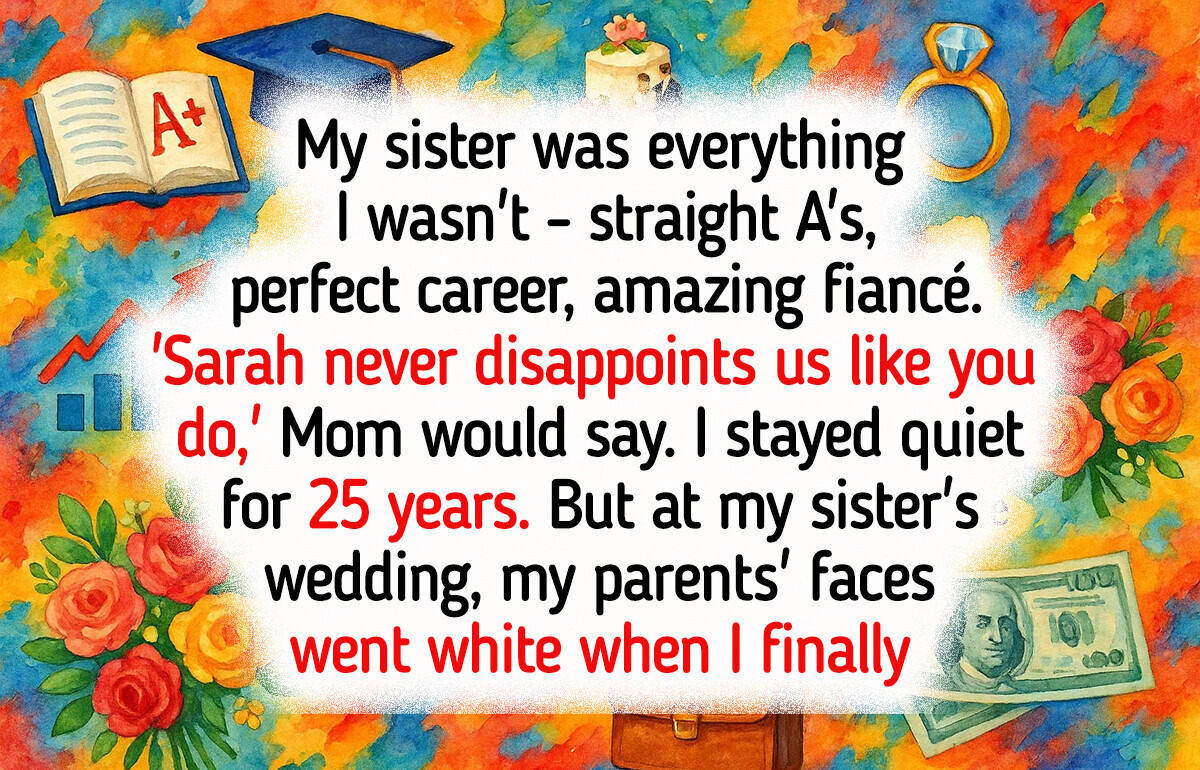
Living in someone’s shadow for your entire life does something to you that’s hard to explain. Every achievement gets compared, every mistake gets magnified, and every family gathering becomes a reminder of how you’ll never measure up to the golden child. The worst part isn’t even the constant comparisons — it’s watching your parents’ faces light up differently when your sibling walks in the room. Sometimes the quiet kid who never fights back reaches a breaking point, and when they finally speak up, the whole family dynamic shifts in ways no one saw coming.
This is Sandra’s letter:
Hi Bright Side,
My sister was everything I wasn’t — straight A’s, perfect career, amazing fiancé. “Sarah never disappoints us like you do,” Mom would say whenever I fell short of her impossible standards. I stayed quiet for 25 years, accepting my role as the family disappointment, while Sarah basked in endless praise and financial support from our parents.
Growing up, Sarah got the brand-name clothes, while I wore hand-me-downs. She got a car for her 16th birthday, while I took the bus. When college time came, they paid her full tuition at a prestigious university while I worked two jobs to afford community college.
The pattern continued into adulthood. When Sarah bought her first house, our parents helped with the down payment. When I struggled to make rent, they told me I needed to “learn responsibility.”
But at my sister’s wedding, my parents’ faces went white when I finally stood up during the speeches and said, “I’d like to share some memories of growing up with Sarah.” Then I calmly read excerpts from my childhood diary — entries about feeling invisible, about crying myself to sleep after family dinners, about wondering why I was never good enough.
The room went silent as I shared 25 years of pain in my own words from when I was just a kid trying to understand why my parents loved my sister more.
I ended by saying, “I love you, Sarah, and I wish you all the happiness in the world. I just wanted everyone to understand why I might seem distant sometimes.” Then I sat down. Sarah was crying, my parents looked shocked, and several relatives came up to me later saying they’d never realized how differently I was treated.
Now my family is furious with me for “ruining” the wedding and making it about myself. Sarah says I embarrassed her in front of her new in-laws. My parents are demanding I apologize for being “dramatic” and “attention-seeking.” But honestly, I feel lighter than I have in years. I finally said what I’d been holding in for decades.
I need advice — did I go too far by speaking my truth at her wedding, or was I justified in finally standing up for myself after 25 years of silence?
— Sandra

I get feeling hurt but you did make your sisters wedding about you. YTA
Sandra, your story breaks our hearts because we can feel the years of pain and frustration behind your decision. We understand how exhausting it must have been to carry that burden of feeling less-than for so long, and we don’t blame you for reaching a breaking point. We hope our advice helps you navigate the aftermath of finally speaking your truth and figure out how to move forward with your family.

I don't believe that your family would have heard you if you had expressed yourself any other way or time. Yes it was a bad choice of time but it sounded necessary. If they weren't guilty then they wouldn't be embarrassed. I know what it's like not to be the favorite.
Don’t apologize for speaking your truth, but acknowledge the timing. Your feelings about years of favoritism are completely valid and needed to be addressed. However, you can acknowledge that a wedding wasn’t the ideal venue without apologizing for the content of what you shared.
Try saying something like, “I’m sorry the timing caused stress on Sarah’s special day, but I’m not sorry for finally sharing how I felt growing up.” This shows you’re thoughtful about the impact while still standing firm on your right to be heard.
Focus on your relationship with Sarah separately from your parents. Your sister might genuinely not have realized how differently you were treated, especially if she was the beneficiary of the favoritism.
Consider having a private conversation with her about your childhood experiences without making her responsible for your parents’ behavior. She might be more open to understanding your perspective when she’s not feeling defensive about her wedding day being affected.

Muy mal hecho.... Le arruinaste el día de su boda !!! no podías haber hecho esto antes o después? parece una venganza contra tu hermana , si así demuestras cariño. no quiero ni pensar lo que harías por odio !!!
Don’t let guilt manipulate you back into the old patterns. Your family will likely try to make you feel guilty of “causing drama” or “hurting everyone’s feelings.” Remember that you didn’t create this situation — you just finally spoke about it. The drama was already there in the form of years of unequal treatment.
Use this as an opportunity to redefine your family role. For 25 years, you accepted the role of the “disappointment” or the “problem child.” Now you get to decide who you want to be in your family moving forward.
You can choose to be the person who speaks honestly, sets boundaries, and refuses to accept less-than treatment. This shift might be uncomfortable for everyone, but it’s necessary for your own well-being and self-respect.
Okay, we need to settle this debate — was Sandra completely justified in finally speaking her truth, or did she cross a line by doing it at her sister’s wedding? Pick a side and share your choice in the comments because we’re genuinely split on this one!
And if you enjoyed this story about finally finding your voice, check out this powerful letter from our reader: “After months of free babysitting and housework, my son-in-law had the audacity to demand I watch his kids during their weekend trip. ’You’ll stay with them, right?’ I smiled sweetly and said yes. But when they left the next morning, I...” Click 👉 here to read what happened next.
Comments
I believe that what you did was correct. First of all, your parents were wrong to show favoritism towards your sister. That, in itself, is traumatic and hurtful to you. Secondly, your sister, instead of speaking out that your parents weren't treating the both of you fairly, she enjoyed the benefits of being the "favored" one in the family and had no consideration for how you felt all those years. And, lastly, among other things, your parents needed to be called out as well as your sister for all the pain and suffering that you endured all those years brought on by your family. It was not revenge on your part. You just wanted for others to know what you had been through all those years. What about you? What about your pain? Your sister and your parents may have been embarrassed or humiliated, but that was only for one moment. Contrary to what you experienced for several years. Maybe it could have been done at a birthday party, or something not so monumental, but, I believe, that you did the right thing. Im sure that your parents knew that their actions were hurting you. You suffered mamy years while your sister enjoyed being the favored child. What you went through was just not moral, acceptable, it wasn't kind, and it will probably, or has probably left deep, deep scars in your life.
I am so sorry that you had to go through that. God bless you.
ALL ARE PUNISHED 😂 YESSS MA'AM you did right. There is no appropriate time to call out abuse either emotional/psychological or physical. You had to do it the way ya did it. No matter what ANYONE ANYWHERE says, you did right. You had to get them when they were all together and when else is EVERYONE including extended family going to all be together again. Probably not for a LONG time and I'm sure a few older folks will probably have passed on by them without hearing your truth. Not everyone is going to agree with your decision to do this but they don't have to. You did the only right thing you could do to REALLY address the reality you lived. Sounds like they weren't supportive of you anyways so you might as well rip that band aid off and put them in their places. You're sister knew how you were treated and she benefited so she's going to feel like "why now why can't you just accept your role and keep your mouth shut" because it's not her nightmare it's not HER problem. So screw them all. You don't need that crap life is FAAAAR too short and we only get one. Live your best life. Be kind be graceful be generous be happy but don't let people get away with treating you like hell. Like Joan Rivers said "let them eat s**t"
OP- You ARE NOT wrong, not for how you feel nor for what or where you decided to express said feelings.
While your sister cannot be held accountable for her role in how your parents treated you when you were children, she certainly has had an option to distance herself from their blatant favoritism and neglect of you in her adulthood. She chose not to as it has benefited her to ignore how they have ALL treated you.
You are resilient and I wish you continued growth and the love you deserve!
You picked the perfect opportunity to get it off your chest. Any other time no one would have heard you.
I think using your sisters wedding was petty and dramatic. You should've skipped the wedding and published those excerpts from your diary publicly on social media. Parents would probably ignore it without the court of public opinion. Honestly though, you probably should have given up on your family when you moved out. Why keep involving yourself with people who only put you down? Its best to cut out toxic people, even family.
Related Reads
I Refuse to Keep Supporting My Adult Stepkids, I’m Only Family When They Need Something

I Refused to Give Up Motherhood to Be My Mom’s Unpaid Caregiver
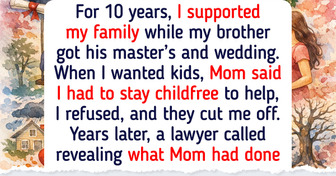
My Boyfriend’s Mom Kept Mocking My Career—My Response Silenced the Whole Table

My Neighbor Refused to Help My Autistic Son, She Wasn’t Ready for My Revenge
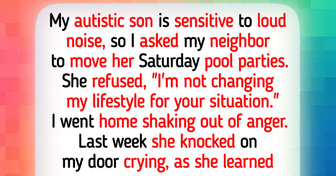
12 Stories That Prove Kindness Is the Strongest Armor
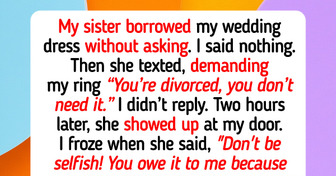
I Refuse to Let My Daughter Attend Her Dad’s Wedding
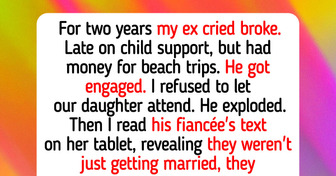
I Refuse to Return My Late Colleague’s Paycheck, Now His Widow Is Furious
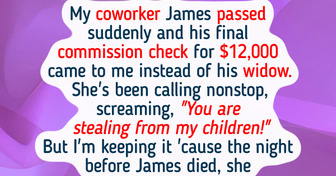
My Parents Told Me I Didn’t Deserve an Inheritance—I Made Them Regret
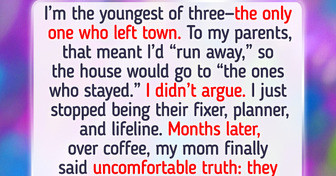
20 Times Quiet Kindness Defeated the Dark Side of People

I Refuse to Give Up My Weekends for Unpaid Work Events—Now HR Stepped In

I Found Out My MIL Was Sabotaging My Gender Reveal—Now I’m the Family Villain
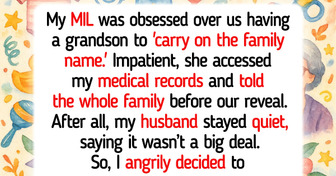
I Refuse to Support My SAHM Wife After Discovering Her Secret

